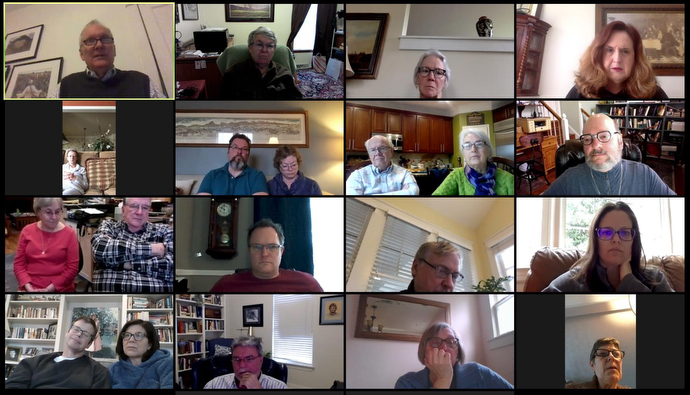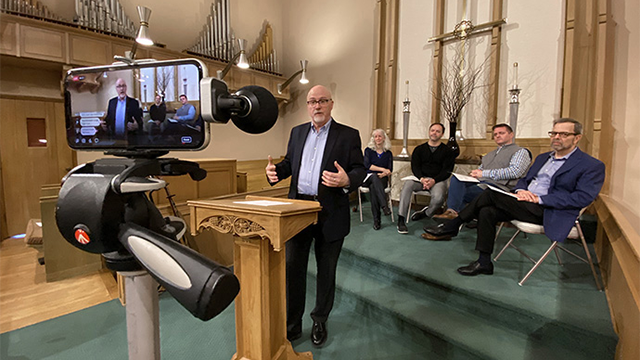
By John W. Coleman
In the spirit of connectionalism, United Methodist general agencies continue to try to help local churches connect with members and survive the disruptions caused by the COVID-19 pandemic. Such connection is crucial for continuing worship, financial stewardship, church administration, Christian education and collective prayer.
Local churches of fewer than 100 members can now request free Zoom web conferencing until January 28, 2021 (a ~$142 value). The offer is provided by United Methodist Communications (UMCom) and the General Council on Finance and Administration (GCFA), both based in Nashville. Access to the free service is available for a limited number of churches and will be awarded on a first come, first served basis. Sign up today.

Meanwhile, UMCom offers a recorded series of Local Church Learning Sessions available on their website. Each training video supports the shift to digital ministry during the COVID-19 pandemic. Learn about:
- Using Zoom for worship and small group meetings
- Copyrights and licenses
- Online worship: livestreaming, tools, platform options and more
- E-giving and Connectional Giving
- Connecting through text messaging
Finally, UMCom also offers the Digital Media for Ministry online training course. “This in-depth guide unpacks the most effective ways to communicate using technology that people in your church and community already use.” Included are podcasts, videos, blogs, social media and email newsletters.
Need help with digital ministry during this pandemic? Live chat with UMCom’s Local Church Services team or call 888-346-3862, Monday – Friday, from 9 AM to 5:30 PM, ET.
The United Methodist Publishing House UMPH) has granted temporary permission for churches to reproduce and livestream selected parts of the UM Book of Worship and UM Hymnal Ritual Resources for online worship experiences until August 30, 2020. Permission is granted only for content listed showing The United Methodist Publishing House, the Methodist Publishing House, or Abingdon Press as the copyright holders in the Acknowledgments section found in the back of the Book of Worship.
The ritual resources in the UM Hymnal (the standard Sunday service materials, Psalter (but not music), funeral, wedding, and morning and evening prayer) for which UMPH owns copyright are also approved for livestreaming and posting online until August 30.
For hymns and tunes from hymnals and songbooks, UMPH recommends churches use reproduction and streaming licenses from OneLicense or CCLI, both of which administer music rights for multiple copyright holders. OneLicense has also announced that it is granting free licenses for one month during COVID-19 pandemic.
UMPH’s Cokesbury business is offering a 14-day free trial of Amplify Media, its multi-media streaming platform that churches can use to livestream worship services, obtain produced Christian content. upload their content and provide home-study opportunities, all for monthly subscription fees based on church size. Find out more at www.amplifymedia.com.
And the Rev. Jacqui T. King, Director of US Connectional Relationships at the UMC’s Discipleship Ministries agency shares a bevy of links to helpful resources from various sources to benefit local churches especially during the pandemic. For more help she can be reached at jking@umcdiscipleship.org.
[/one_half][one_half_last] [box color=”gray”]
Impact of COVID-19 on United Methodist churches
United Methodist Communications’ Research Team launched a study on March 26 to assess the impact of the coronavirus on local church activity levels, including ways churches are adapting and identifying interest in resources and tools to support local church during the crisis.
Almost two-thirds (63%) of respondents are from churches with less than 100 average weekly attendance, and two-thirds (66%) of respondents describe their church as rural or small town.
- Almost two-thirds (63%) of respondents are from churches with less than 100 average weekly attendance, and two-thirds (66%) of respondents describe their church as rural or small town. According to GCFA data, small churches are slightly underrepresented. Larger churches are concentrated in suburban/urban areas. Over half of the smallest churches (< 50) are in rural areas. The medium sized churches are spread across the different areas.
- Two-thirds (67%) are using online or livestream worship during the crisis, and 14% have cancelled all services. Cancelling all services is more prevalent in smaller churches, with only 37% indicating they are using an online or livestreamed worship.
- Guidance from Bishop or Annual Conference (82%) and state or national government (72%) most influenced coronavirus crisis approach to worship. Regardless of size, churches equally rely on conversations with other nearby churches.
- Two-thirds (66%) plan to continue their current approach to worship, and 13% are unsure of their plans. Smaller churches are less certain of their future plans.
- Almost half (46%) are livestreaming to Facebook or YouTube. Only 5% livestream to their website. Facebook seems to be the “go to” for smaller churches, if they are livestreaming at all. Larger churches indicate use of multiple methods.
- The biggest obstacle to online worship is “connecting with people who are not digitally connected” (73%). For smaller churches this seems to translate into lack of technology resources (access, knowledge and funds).
Interested? Read the rest of the study’s highlights [PDF]. And learn more about the findings in PowerPoint slides [.pptx download].

We will add these to our Coronavirus Ministry Response webpage:
Children’s Ministry:
- Sharing Kindergarten https://sharingkindergarten.com/continuous-learning-activities/?fbclid=IwAR19PyIGNdhBJ905wuSMSvjq6sMKPUk0Jko70pmoTBNjfFssYJcvDXo-MoQ
- Virtual Field Trips https://adventuresinfamilyhood.com/20-virtual-field-trips-to-take-with-your-kids.html?fbclid=IwAR3Bib0dX6EGplukLB_ruSp3t9ow7CLfxu2TUEb5sA1lP0IRbfEviIzmhg4
- Non-screen activities with kids https://medium.com/pobble/simple-and-fun-non-screen-activities-that-children-can-do-at-home-115543cb3b9c
- Praying with Kids https://www.illustratedministry.com/2017/ways-to-pray-with-kids/
- Cooking with Kids https://www.pbs.org/food/theme/cooking-with-kids/ and https://cookingwithkids.org/resources/ (bilingual English / Spanish resources)
[In addition, check out Helping children process coronavirus on UMCom’s website.]
Online / Streaming Options:
- Summary of how to stream / streaming options https://www.lifewire.com/tools-for-broadcasting-live-video-3486110
- Technology beyond the sanctuary – Part 1 https://www.resourceumc.org/en/content/use-technology-to-extend-worship-beyond-the-sanctuary-part-1
- Church Online – Part 2 https://www.resourceumc.org/en/content/how-to-stream-worship-beyond-the-sanctuary
- Starting Online Small Group Studies http://www.umcom.org/learn/9-tips-for-starting-online-small-groups

How to share church closure and online worship options in an Emergency / Communication Practices:
Some congregations may have general cancellation policies for weather or emergencies. Critical information includes timely communications. The Administrative Council, Trustees, Single Board would normally develop it. Here are a few general practices that can be modified for our current times:
- Minetto UMC http://minettoumc.org/administration/church-cancellation-policy/
- UMC Communications – where to worship online / find-a-church info (can be updated for emergency situations) https://www.umc.org/en/content/where-to-worship-online and https://www.umnews.org/en/news/churches-adapting-to-covid-19-restrictions
- News Coverage / Annual Conference info https://www.newsobserver.com/news/local/article241140611.html
- Phone trees and email blast are used to share immediate changes; include limited staff at the church to answer questions and respond to persons that may come to the church directly.
- Sample Emergency Response Plan (framework) https://www.westohioumc.org/sites/default/files/conference/documents/pdf/page/local-church-crisis-communication-plan-template.pdf and https://www.susumc.org/crisis-communication-plan/
- Tips for Crisis Communication https://www.resourceumc.org/en/content/5-tips-for-crisis-communications
- Crisis Communication Plan (GCFA / Pg. 2) https://www.gcfa.org/media/1268/section-5-risk-management.pdf
- What a DS Needs to Know (UMC cyber-course) https://www.umccybercampus.com/crisis-communication-what-a-ds-needs-to-know/
Worship and more:
- Hymns in times of crisis: https://www.umcdiscipleship.org/resources/hymns-in-times-of-crisis
- Articles from Discipleship Ministries https://www.umcdiscipleship.org/articles/stop-the-spread-of-covid-19-in-church and https://www.resourceumc.org/en/content/stop-the-spread-of-covid-19-in-church
- Financial Leaders https://www.umcdiscipleship.org/articles/10-ideas-for-church-financial-leaders-amid-the-covid-19-crisis
- Hygiene and Communion https://www.umcdiscipleship.org/resources/clean-hands-and-pure-hearts-hygiene-and-holy-communion
- UMPH grants use of Book of Worship https://www.umph.org/Current-News/ArtMID/471/ArticleID/43/The-United-Methodist-Publishing-House-Grants-Temporary-Permission-for-UM-Book-of-Worship-Content and https://www.umcdiscipleship.org/book-of-worship (resources by seasons)
- Worship beyond storms (prayers that can be modified) https://www.umcdiscipleship.org/articles/words-and-worship-after-the-tornado
- Worship Series and Planning https://www.umcdiscipleship.org/worship-planning/selah-life-in-a-minor-key and https://www.umcdiscipleship.org/worship-planning
- Resources for Children and Families https://www.umcdiscipleship.org/equipping-leaders/children
Communications / Online Worship:
- Crisis Communications http://www.umcom.org/news/how-to-communicate-in-the-wake-of-tragedy
- Launch Online Experiences https://www.resourceumc.org/en/content/use-technology-to-extend-worship-beyond-the-sanctuary-part-1 and https://www.resourceumc.org/en/content/how-to-stream-worship-beyond-the-sanctuary
- Web Ministry Permissions https://www.resourceumc.org/en/content/web-ministry-privacy-and-permissions
- Communicating Changes in Worship https://www.umnews.org/en/news/churches-adapting-to-covid-19-restrictions
- Web Ministry – Start & Sustaining it beyond the crisis https://www.resourceumc.org/en/topics/web-ministry-and-social-media
Here are a few items that I found beyond DM:
- Article about UMCOR support: https://www.umcmission.org/umcor/learn/news-and-stories/2020/press-release-2020/umcor-moves-to-support-local-partner-in-china-fighting-coronavirus-crisis
- National Institutes of Health https://www.nih.gov/health-information/coronavirus
- World Health Organization (WHO) https://www.who.int/health-topics/coronavirus
- Updates for Emory https://news.emory.edu/stories/2020/01/er_tn_coronavirus/campus.html
- Global health tracker https://www.kff.org/global-health-policy/fact-sheet/coronavirus-tracker/
- Vanderbilt Global Health Support https://www.vumc.org/globalsupport/ and Emergency Preparedness https://emergency.vanderbilt.edu/vu/coronavirus/index.php
